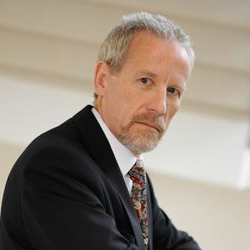
by Keith Grint
- 20 September 2021
Share:
I once attended an Open University summer school here in the UK and one evening, on my way to the bar with a colleague, I walked past a notice board festooned with the details of optional evening meetings and courses for the “mature” students attending school that week. As we walked past, I hesitated at various notices and appeared to sign up only to change my mind and move to the next equally enticing offering. My colleague came up behind me, took the hand holding my pen and gently guided me to the middle of the board, where he made me put an “X” at the bottom of the notice in the middle: It was for “Decision-Making.”
Leadership is often associated with certainty; indeed, it is sometimes reduced to the decision-making process such that anything which smacks of uncertainty is categorized as weakness or a failure of leadership. And yet, when faced with wicked problems, we know that we cannot know what to do, we cannot be certain. One might argue that many of the processes, procedures, systems, charts, and the like are constructed not so much to enhance efficiency and effectiveness – to increase certainty – but actually the opposite. They are created to mask from others and ourselves the alarming truth that we don’t really know what to do. In effect, the material symbols of organizational life have as much to do with concealing our existential angst about uncertainty as they do with anything else. We see this in leadership writings, which often have titles with words like “Irrefutable” or “Essential” in them. We almost never have titles like Leadership: A Few Ideas That Might Work or You Know I’m Making This Stuff Up About Guaranteed Successful Leadership Strategies, but You Just Bought This Book so You’re Part of the Problem Aren’t You? Indeed, I’m reminded of a recent quiz that asks you to concentrate on the black dot on a brown horse for 15 seconds after which the horse will change color to match your mood. There are several different colors in the mood chart below the horse ranging from white, which denotes hunger, to red revealing anger and light green demonstrating stress, but the clue is the last color – the same as the horse – which just says “Gullible.”
Leadership is often associated with certainty; indeed, it is sometimes reduced to the decision-making process such that anything which smacks of uncertainty is categorized as weakness or a failure of leadership.
Keats, the poet, was a great proponent of what he called “negative capability,” that is, the ability to not make decisions and to be comfortable in the land of uncertainty and ambiguity. As Keats (1899) put it: “I mean Negative Capability, that is, when a man is capable of being in uncertainties, mysteries, doubts, without any irritable reaching after fact and reason” (p. 277). Or, as Brook et al. (2015) argue, when facing wicked problems, we may have to “unlearn” existing responses and accept that not knowing and non-action are perfectly legitimate and indeed necessary responses.
So often people insist that decision-making is a critical skill, especially in a crisis when people believe that “something must be done” or that “doing nothing is not an option.” An illustration that might best refute this “do something” refrain might be to imagine yourself leading a group on a treacherous mountain path where one wrong footstep could lead to disaster. As a fog suddenly descends to enshroud the group, you call a halt, and that generates high levels of anxiety. There might well be lots of voices demanding that you “show leadership” and “do something,” but perhaps the best course is to do nothing, to have everyone stand perfectly still until the fog lifts; that way, no one is in immediate danger from stepping off the path into the abyss. The call to inaction, to do nothing, is actually a decision. You have not manifestly failed by appearing to be incapable of making a decision. On the contrary, you have taken the decision to do nothing.
The abyss, of course, plays a significant role in Nietzsche’s (1886/2003) Beyond Good and Evil where he warns, “Whoever fights monsters should see to it that in the process he does not become a monster. And when you look long into an abyss, the abyss also looks into you” (p. 146). This is often associated with his nihilistic tendencies, but it can also be read as a warning about seeking out totality, searching for perfection, and the quixotic quest for certainty. Indeed, that quest has reflections of Just World Theory (Lerner and Montada, 1998), where “people get what they deserve.” In effect, this attributes consequences not to your intentions or actions but to a universal providence that ensures a natural equity: What goes around comes around. This leads to claims about decision-making that all too often blame the victim: Thus, for example, violence against women is blamed on the dress, actions, or attitudes of women, rather than on the actions of violent men or specific patriarchal cultures. This facilitates our own self-protection only in the sense that it (erroneously) implies that we will not be the subject of violence IF we comply with such social norms.
The contrary opinion suggests that what occurs in life is often also just random: Stuff happens. Or, as Jean-Paul Sartre (1944/1989) insisted, Jean-Jacques Rousseau (1762/1974) had it back to front: We are not born free and are everywhere in chains, as he says in the opening lines of The Social Contract, but rather we are condemned to be free because we are ultimately free agents and are responsible for all our decisions, even those made under constraints. By implication, therefore, leadership is not predicated on removing uncertainty because uncertainty is the sine qua non of leadership. Why would we need leadership if we all knew what to do? Might that be a clue to our continuing love for leaders whose confidence knows no bounds, even when their competence remains strictly limited?
Finally, we might take a lead from science and understand from Karl Popper that scientific advances do not occur when scientists prove something to be true because scientific truth is only ever contingent – the sun might not rise tomorrow, and a black swan might exist. Rather, if we search for error, we can make our findings more robust. Yet how often do we see published leadership articles that explain the aim, the length of time taken, and the expensive research methods adopted, only to discover that the results don’t support any hypothesis? Yet this is how most science operates – it seeks out uncertainty as a necessary condition for progress. Most interview panels, however, would not take kindly to any answers along the lines of, “Well, I’m not sure actually!” Imagine being interviewed for a leadership post with a first-class sports team and being asked whether you can get the team to the top of their league within two seasons. “‘I doubt it!” might be the truthful response, but it probably wouldn’t get you the job. We like to pretend we can control events with enough will power or positivity or charisma or authenticity or whatever else happens to be in vogue at the time. In short, we are all in on this charade of certainty because it helps us reduce our own anxiety about the uncertain reality we actually know exists. So dear reader, did my course on decision making help me? Well, I used to be indecisive, but now I’m not so sure.
References
Brook, C., Pedler, M., Abbott, C. and Burgoyne, J. (2015). On stopping doing those things that are not getting us to where we want to be: Unlearning, wicked problems and critical action learning. Human Relations 69(2), 369-389. https://doi.org/10.1177/0018726715586243
Keats, J. (1899). The Complete Poetical Works and Letters of John Keats. Houghton, Mifflin and Company.
Lerner, M.J. and Montada, L. (1998). An Overview: Advances in Belief in a Just World Theory and Methods. In L. Montada& M.J. Lerner (Eds.), Responses to Victimizations and Belief in a Just World. Plenum.
Nietzsche, F. (1886/2003). Beyond Good and Evil. Penguin.
Rousseau, J.J. (1762/1974). The Social Contract. Penguin.
Sartre, J.P. (1944/1989). No Exit. Vintage International.

Keith Grint is Professor Emeritus at Warwick University. He has held Chairs at Cranfield University and Lancaster University and was Director of Research at the Saïd Business School, Oxford University. He is a Fellow of the International Leadership Association (ILA) and Professorial Fellow of the Australian Institute of Police Management (AIPM). He is also a founding co-editor with David Collinson of the journal Leadership, and co-founder of the International Studying Leadership Conference. He received ILA’s Lifetime Achievement Award in 2018. His books include The Arts of Leadership (2000); Organizational Leadership (2005); Leadership: Limits and Possibilities (2005); Leadership, Management & Command: Rethinking D-Day (2008); Leadership: A Very Short Introduction (2010); and Mutiny and Leadership (2021).

